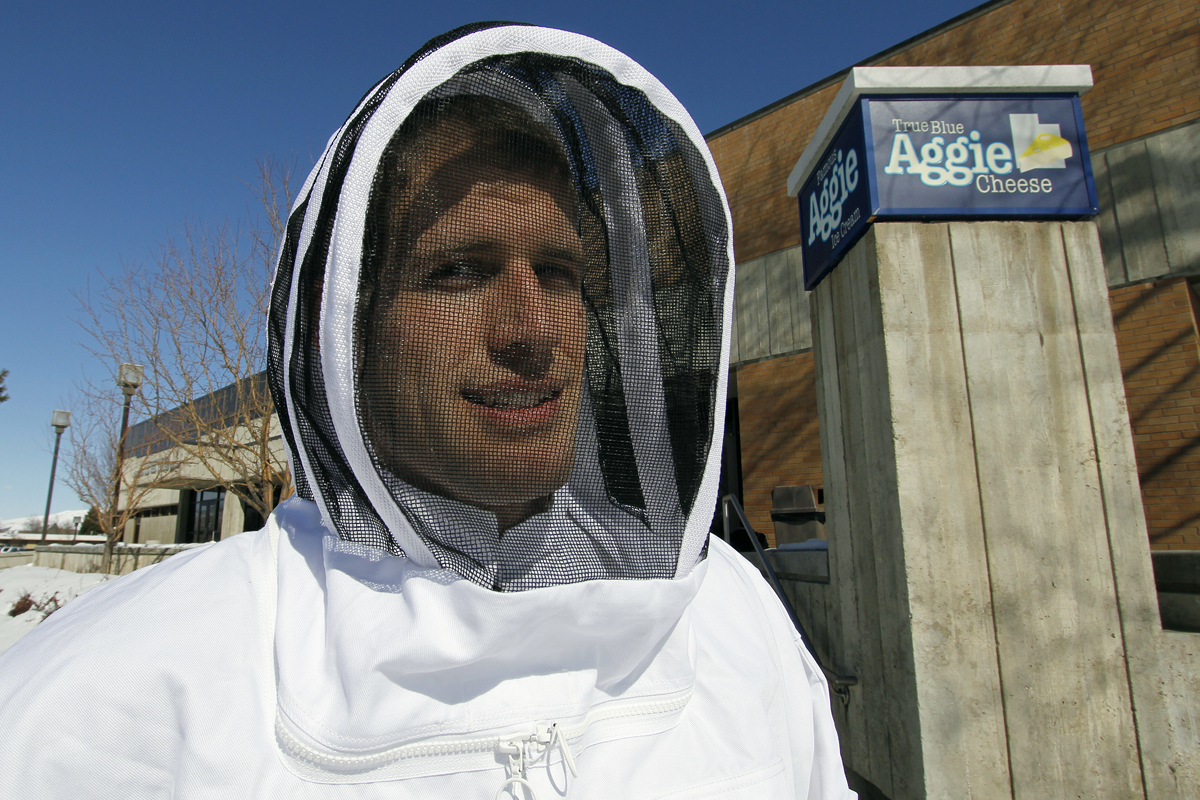Student works toward dream of Aggie Honey
The USU Entomology and Bee Keeping Club, formerly known as the Entomology Club, is raising honey bees starting this Easter and plans to eventually have a brand called “Aggie Honey.”
“This is the first time a USU club has raised honey bees,” said club president Joel Smith. “The dream is to have Aggie Honey, like they have Aggie Ice Cream, and develop Aggie Honey products to have candles and lip balm. There is a lot of market for it because people want raw, natural honey, not reserved or pasteurized. The honey could also be used by the nutrition club and students could conduct research on how pollen and honey affect allergies.”
Smith’s goal is to get the honey bees established, meaning the bees are healthy and there is a reliable source of honey, and then try to sell the honey at Aggie Ice Cream.
“We are not currently selling honey at Aggie Ice Cream,” Smith said, “that is just a dream in the future. I have already talked to them and they said once we get things going to give them a call.”
The club did a fundraiser selling donated honey during Valentine’s Day in order to fund the purchase of the honey bees. Smith said typically if you buy the bees on Valentine’s Day, like the club did, you get them on Easter. The club already built the boxes and frames for the bees and has made arrangements to grow them at the Craig Alston Park across from Aggie Station.
“As soon as they get here, we are going to have weekly classes that anyone can come to and see the hives growing,” Smith said. “The classes will be held once a week for six to eight weeks.”
Smith said the first year will mostly be a building year. The club has to make sure the new queen is laying eggs and the bees are all healthy. If the bees are functioning normally, the club should be able to gather honey in early summer and late fall.
After talking with the Cache Valley Bee Keepers Association, Smith discovered the amount of honey being made is going down because bees are dying. Diseases are reaching the hives and slowing down production.
“If we have a good year, we are hoping to get 50 pounds or something,” Smith said. “Getting that would be really good. It all just depends; there are a lot of factors.”
Smith hopes raising honey bees can be an ongoing thing for the club. It will help them do more outreach to elementary kids and the community in general.
Smiith said originally the Organic Farm Club was interested in raising honey bees. They contacted the Cache Valley and Box Elder bee inspector, Martin James, and asked him to teach a few workshops on how to raise bees. James taught three classes on campus and then held various hands-on sessions at one of his bee farms.
A USU biology graduate student, Virginia Jennings Bolshakova, who is also a member of the Entomology and Bee Keeping Club, was particularly interested in raising bees because her parents are both organic farmers. Bolshakova and her husband attended James’ classes faithfully and eventually started raising their own bees on the Organic Farm Club’s property.
This summer, Smith helped Bolshakova with research and had the opportunity to learn how to tend the bees a couple of times. Bolshakova, together with James, encouraged Smith to raise honey bees with the Entomology and Bee Keeping Club.
“I really encouraged him as the president to really look into this because I was willing to be a support person,” Bolshakova said. “There are so many people in the department who know a lot about bees that can also help and Martin James has already been helping.”
In addition to his role as the Cache Valley and Box Elder bee inspector, James is also a commercial bee keeper, owning 3,000 hives in Cache Valley. He donated some honey for the fundraising sale in the TSC, which gave the club the money to start their project.
“It will be a lot of work for the Entomology and Bee Keeping Club, but I think they are motivated and it is possible to do,” James said. “There are many universities that raise and sell honey. The University of Nebraska-Lincoln, they also have honey bees and sell the honey to help fund a couple of programs.”
James feels that best thing about the club raising honey bees is the understanding people will gain about how everything fits together with the honey bee.
“I don’t think everyone understands how intrinsic the honey bee is with food,” James said. “One bite out of every three comes from the honey bee.”
James explained that when he does presentations at elementary schools he asks the kids by a raise of hands how many of them drank milk that morning. Then he asks them if bees helped produce that milk. Naturally, the children say no. He then tells the children bees actually did take part in it. If it were not for honey bees, the alfalfa that feeds the cows would not be pollinated. If the alfalfa is not pollinated, the cows won’t be able to produce their milk.
Bolshakova said: “Albert Einstein once said, ‘If the bee disappeared off the surface of the globe, man would have only four years left to live.’ Bees and humans have such an important working relationship with each other. They provide pollen for all our produce. I think this will be a really important contribution the club will be able to give back to the community. The bees give the students learning about bees and humans cooperation. That will give the students more than the honey.”
– kayla.barclay@aggiemail.usu.edu

